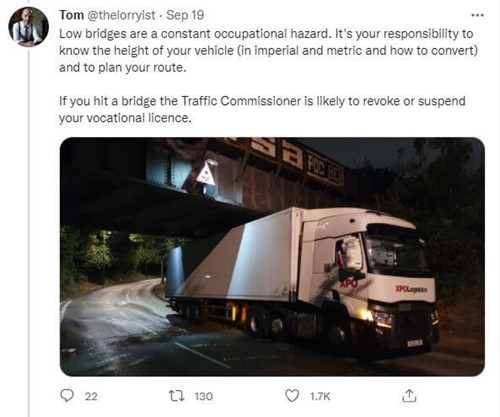The recent HGV driver shortage has caused supply problems across the UK. As a result, companies may request drivers to work extra shifts or extra hours. However, the safety and legal issues this poses mean it’s unlikely to be worth the risk.
Here’s the current situation…
What is causing the HGV drivers shortage?
The problem has been building for some time, and finally reached a critical point in September 2021. At the end of the month, the Road Haulage Association (RHA) estimated an actual shortage of more than 100,000 qualified drivers in the UK.
In a recent survey by the RHA, the leading reasons behind the shortage according to haulage companies are:
- Drivers retiring
- Brexit
- IR35 changes
- Pay rates
- Covid-19
The government response to the shortage involves a few different methods to attract drivers back to the industry. Looking at the lack of supply in petrol stations, the government relaxed the rules about the daily driving limit. This means drivers can legally drive for 11 hours twice a week, increasing from nine hours maximum previously.
Weigh HGV drivers shortage issues against the risks involved by requesting them to drive for 11 hours a day. With daylight hours shorter now and difficult weather conditions looming, is it really worth the risks?
The working time directive
For a full rundown of the Working Time Regulations 1998—or the working time directive—see our blog here.
These regulations protect the wellbeing and safety of your staff. Tiredness can kill, and a lorry crashing on a motorway puts many more people at risk that just the HGV driver.
The basic tenants of the working time directive are:
- No individual should work more than 48 hours a week on average.
- Employees are entitled to 5.6 weeks paid time off per year.
- Individuals are entitled to a 20-minute rest break for working days longer than six hours.
- 11 hours of rest between working days.
- A minimum of one day off per week.
- A rest of at least 24 hours in every 7 days or 48 hours in every 14 day period.
- Work over eight hours – for night shifts – in any 24 hours period is not allowed.
Finally, an individual can opt out of the regulations if they wish. If they do this, that doesn’t mean you can set whatever hours you please without rest breaks. You have a duty of care as an employer and failing to provide basic care could result in legal consequences.

A day in the life…
A lorry driver faces numerous risks to their health every day—physical and mental. A recent Twitter thread by Lorry driver Tom Reddy highlighted this.
The thread broke down a 12-hour shift beginning Sunday morning. The first tweet, that went up at 11:50pm on Saturday, highlighted what his shift really looked like. It started with an hour drive to the depot. The HGV driver would not return home until past 5pm on Sunday.
The thread clocked various events throughout the journey, including the time stamp of each one. It also drew attention to the different safety checks and issues encountered throughout the shift. Before the driver even left the depot, he encountered risks that he had to deal with. He noticed a loose metal bar in the trailer. Next, the process of connecting the trailer to the lorry highlighted further hazards.
Once on the road, Reddy mentioned the solitude of the job, and how it can affect a driver’s mental health. He also talked about general fatigue of long shifts, with insight on the working time directive’s rest breaks:
“Having almost been on the clock for 6 hours. The Working Time Directive is shortly due to bite me unless I record sufficient break. So we will sit here and scroll twitter for 15 minutes while we pretend sitting in the same seat I have spent the last 6 hours in is relaxing.
Why is it important to understand the complex rules around driving hours?
I don't get paid for breaks. Very few of us do.
We are paid by the hour, all breaks deducted. So taking more breaks than you need cuts into your wages quite significantly on a long day.”
The health & safety risks to HGV drivers
Almost all deaths in haulage arise from four types of accident:
- Being struck by a moving vehicle
- Falling loads
- Falls from vehicles
- Collapsing or overturning vehicles
Bear in mind that most of the time the lorry driver will be unloading and loading the cargo themselves. Therefore, many major injuries that occur are a result of manual handling.
You can prevent many of the most common accidents by conducting a full risk assessment and removing the hazards when you find them.
A key part of your assessment is consulting with your employees. Just as Tom Reddy highlighted unforeseen issues in his Twitter thread, so could your drivers. Take their feedback on board and implement sensible, reasonable measures.
Don’t turn a blind eye to areas such as fatigue and mental health. Long hours on the road, alone and in the dark, can take a toll on HGV drivers’ wellbeing. A distracted or overtired driver can pose a serious risk to their own safety and others. Ultimately, the responsibility of an accident will come to you. The working time directive is there to help with issues such as fatigue, so make sure your drivers are taking breaks. Check in with them regularly and provide access to mental health support, if possible, via an employee assistance programme.
Expert support
Is the HGV driver shortage causing HR or health & safety issues for your business or staff? Speak to one of our consultants today for expert advice, 24/7, on 01455 858 132.
Related resources
Categories
- Business Advice
- Contracts & Documentation
- Culture & Performance
- Disciplinary & Grievances
- Dismissals & Conduct
- Employee Conduct
- Employment Law
- End of Contract
- Equality & Discrimination
- Health & Safety
- Hiring & Managing
- Leave & Absence
- Managing Health & Safety
- Moving
- Occupational Health
- Pay & Benefits
- Recruitment
- Risk & Welfare





